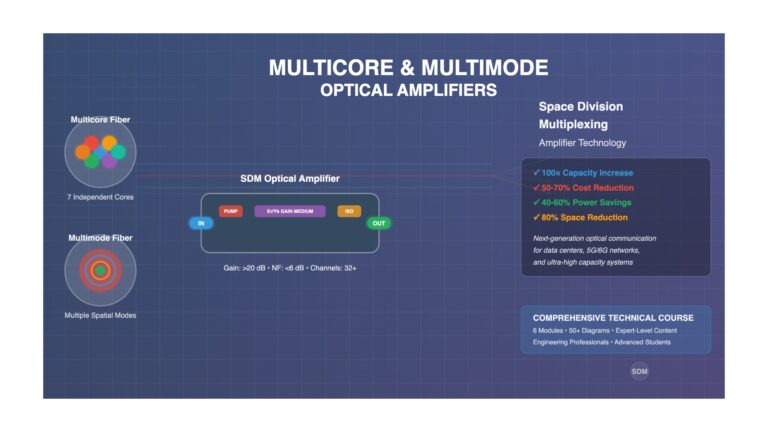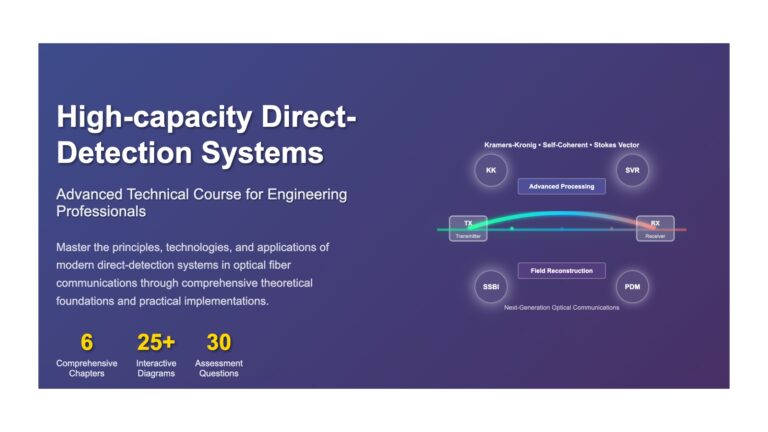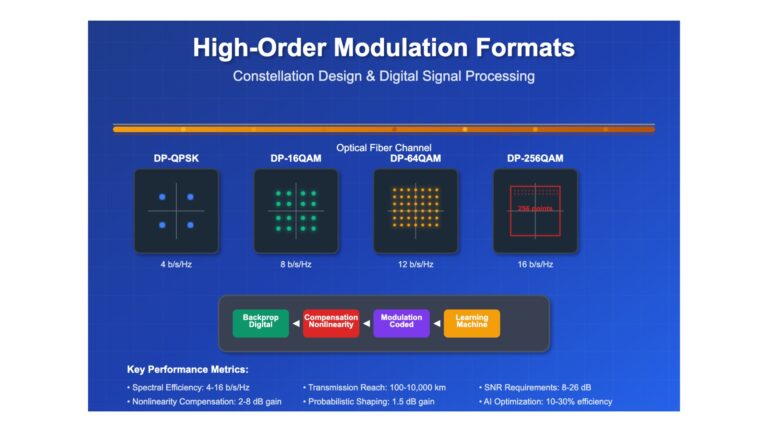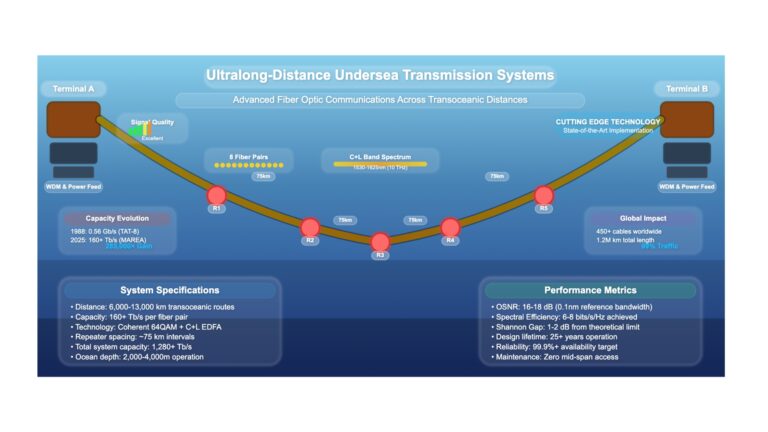Description
Curriculum
Instructor
Course Overview
Welcome to the comprehensive course on Optical Networks! This professional-grade curriculum takes you from fundamental principles to advanced implementations, preparing you for the evolving world of optical communications.
Learning Objectives
Upon completion of this course, you will be able to:
- Master the fundamental principles of optical transmission and networking
- Design and analyze optical network architectures
- Understand advanced concepts in signal processing and modulation
- Implement industry best practices for network deployment and maintenance
- Navigate future trends and emerging technologies
Course Structure
📚 14 In-Depth Modules:
- Optical Network Fundamentals
- Light Transmission Concepts
- Historical Development
- Network Components
- Advantages & Applications
- Industry Evolution
- Basic Network Types
- Network Layers
- Signal Processing Basics
- Industry Standards
- Network Elements
- Safety Guidelines
- Market Overview
- Future Trends
Key Features
🔷 Comprehensive Coverage
- Detailed theoretical foundations
- Practical implementation guidance
- Industry-standard protocols
- Real-world case studies
🔷 Interactive Learning
- Hands-on exercises
- Interactive simulations
- Practice problems
- Self-assessment quizzes
🔷 Professional Development
- Industry-relevant skills
- Current technologies
- Future-ready knowledge
- Best practices
Course Requirements
Prerequisites:
- Basic understanding of networking concepts
- Fundamental knowledge of electronics
- Mathematics background (calculus and linear algebra)
Technical Requirements:
- Computer with internet access
- Calculator for numerical problems
- Access to simulation software (provided)
Assessment Methods
- Module quizzes (30%)
- Practical assignments (40%)
- Final examination (30%)
- Bonus: Hands-on projects
Certification
Upon successful completion, you will receive:
- Professional certification in Optical Networks
- Detailed competency assessment
- Industry-recognized credentials
Industry Applications
This course prepares you for roles in:
- Telecommunications
- Data Centers
- Network Design
- System Integration
- Research & Development
- Network Operations
Course Timeline
- Total Duration: 60 Hours
- Recommended Pace: 4-6 Hours/Week
- Completion Time: 10-15 Weeks
Curriculum
- 14 Sections
- 14 Lessons
- 10 Weeks
Expanse all sectionsCollapse all sections
- 1.Basic Principles & Theory1
- 2.Light Transmission Concepts1
- 3.Historical Development1
- 4.Network Components1
- 5.Advantages & Applications1
- 6.Industry Evolution1
- 7.Basic Network Types1
- 8.Network Layers1
- 9.Signal Processing Basics1
- 10.Industry Standards1
- 11.Network Elements1
- 12.Safety Guidelines1
- 13.Market Overview1
- 14.Future Trends1
Call to a member function get_id() on bool
Review

$11.00
$3.00
1 student
14 lessons
Language: English
0 quiz
Assessments: Yes
Skill level Beginner
Courses you might be interested in
Advanced Technologies
Learning Objectives Understand the capacity limitations of conventional single-mode fiber systems Analyze the benefits and challenges of space division multiplexing approaches Compare multicore fiber (MCF) and multimode fiber (MMF) implementations...
-
42 Lessons
Free
Advanced Technologies
Learning Objectives Understand the fundamental principles of direct-detection optical communication systems Compare direct-detection systems with coherent detection systems Identify key applications and advantages of direct-detection technology Analyze the basic architecture...
-
51 Lessons
Free
Advanced Technologies
Learning Objectives Understand the basic principles of optical fiber communication systems Analyze the fundamental limitations in optical transmission Explain the role of digital signal processing in modern optical systems...
-
53 Lessons
Free
Advanced Technologies
Learning Objectives After completing this chapter, you should be able to: Explain the historical development and significance of undersea transmission systems Identify the key components and architecture of modern undersea...
-
44 Lessons
Free





